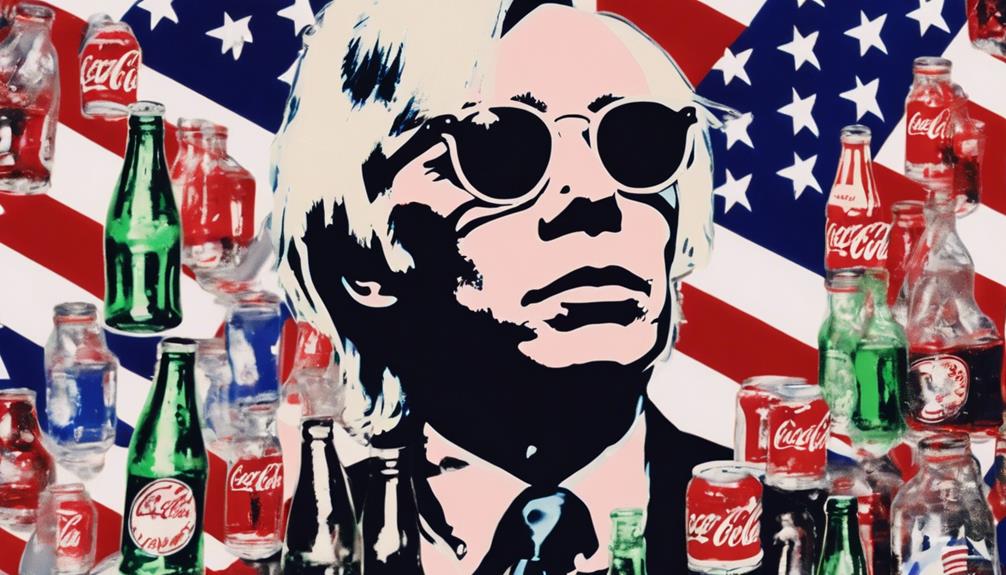Andy Warhol's art deeply reflects his fascination with the American Dream, interweaving themes of consumer culture, celebrity adoration, and societal norms. His upbringing influenced his unique perspective, leading to groundbreaking work within the Pop Art movement. Warhol used his art to comment on the complexities of American society, exploring the allure of fame and materialism. His lasting impact on contemporary art and popular culture is undeniable, sparking debates and controversies surrounding artistic values. Warhol's legacy as a pioneering figure in Pop Art continues to shape cultural values and challenge traditional artistic boundaries. Discover more about his intricate relationship with the American Dream.
Key Takeaways
- Warhol critiqued and celebrated American society through his art.
- His works challenged consumerism and celebrity obsession.
- Warhol depicted the commercialization of fame and beauty.
- He explored the complexities of celebrity culture and mass media influence.
- Warhol's legacy and influence extend to modern society, fashion, and music.
Early Influences: Warhol's Childhood and Upbringing
Warhol's artistic inclinations were nurtured from a young age by his mother, Julia Warhalla, in their industrial Pittsburgh neighborhood. Growing up in a tough working-class area, Warhol's immigrant background exposed him to a melting pot of American culture and deep-rooted beliefs. This environment played an important role in shaping his artistic vision and obsession with iconic American figures.
Warhol's mother, Julia, played a significant role in fostering his talent, encouraging his passion for art and even helping him build a collection of signed celebrity photographs, including notable personalities like Shirley Temple.
Despite facing health challenges like rosacea and Saint Vitus dance disease, Warhol's homeschooling due to illness allowed him to explore further into his artistic pursuits and develop an intense fascination with American icons. Additionally, his attendance at Saint John Christendom Church further influenced his views on American culture and the pursuit of the American Dream.
Warhol's formative years in this environment laid the foundation for his future artistic endeavors and deep-seated connection to American ideals.
Pop Art Movement: Warhol's Breakthrough

Growing from his formative years deeply influenced by American culture, Andy Warhol made a significant impact on the art world with his breakthrough in the Pop Art movement of the 1960s. Warhol's shift towards Pop Art marked a significant departure from traditional Fine Art practices, as he began focusing on everyday consumer products and celebrities as the subjects of his work. By embracing these unconventional subjects, Warhol challenged the boundaries of the art world, revolutionizing the way art was perceived and created.
| Pop Art Movement | Warhol's Breakthrough |
|---|---|
| Embraced consumer products and celebrities | Challenged traditional art boundaries |
| Iconic works like Campbell's Soup Cans | Revolutionized perception of art |
| Featured Marilyn Monroe portraits | Captured essence of American popular culture |
| Critiqued and celebrated American society | Made a lasting impact on the art world |
| Critiqued consumerism and celebrity obsession | Influenced future generations of artists |
Warhol's groundbreaking approach to art in New York during the 1960s paved the way for a new era of artistic expression, with his innovative techniques and subject matter coming back to redefine the art landscape.
Consumer Culture: Warhol's Commentary Through Art

Through his art, Andy Warhol provided a thought-provoking commentary on consumer culture, challenging societal perceptions of mass production and celebrity obsession. Warhol's fascination with consumer products like Campbell's Soup cans and Coca-Cola bottles served as a lens through which he critiqued the commodification of everyday objects. By repetitively depicting these images, Warhol highlighted the pervasive nature of consumer culture and its influence on American society.
His use of popular icons such as Marilyn Monroe further underscored the commercialization of fame and celebrity obsession prevalent in the culture of his time. Warhol's exploration of consumerism in his art worked well to challenge conventional ideas of beauty and value, prompting viewers to reconsider their relationship with material goods.
Celebrity Obsession: Warhol's Portraits of Fame
Andy Warhol's exploration of consumer culture smoothly shifts into his fascination with celebrity obsession, evident in his vibrant and repetitive portraits of iconic figures like Marilyn Monroe and Elvis Presley. Through these works, Warhol captured the essence of celebrity culture, delving into themes of fame, beauty, and the allure of popular culture.
His Marilyn Monroe series, in particular, stands out for its portrayal of the complexities of celebrity and the profound influence of mass media on society.
Warhol's portraits of fame not only celebrated the glamour of these iconic personalities but also challenged traditional notions of art and celebrity. By blurring the lines between high art and popular culture, Warhol redefined the concept of celebrity within the art world.
His repetitive and colorful depictions of famous figures like Elizabeth Taylor further solidified his status as a trailblazer in the domain of celebrity portraiture, leaving a lasting impact on the intersection of art and fame.
Legacy and Influence: Warhol's Lasting Impact

Andy Warhol's enduring legacy and influence are evident in the continued inspiration he provides to contemporary artists. His lasting impact on popular culture can be seen in the widespread reach of his iconic works. From his exploration of consumerism and celebrity culture to his innovative approach to mass production, Warhol's artistic influence remains pervasive in the art world.
Beyond art, his profound impact extends to fashion, music, and various facets of modern society. This solidifies his status as one of the most important artists of the 20th century.
Lasting Artistic Influence
His iconic works, such as the Campbell's Soup Cans and Marilyn Monroe portraits, continue to inspire contemporary artists and challenge traditional art boundaries, showcasing Andy Warhol's lasting artistic influence.
Warhol's exploration of themes like consumerism, mass production, and celebrity obsession has left a significant impact on the art world and popular culture. His legacy extends beyond art to influence fashion, music, and various aspects of popular culture, highlighting his deep connection to the American Dream.
Regarded as one of the most important artists of the 20th century, Warhol's influence can be observed in the work of numerous illustrators and artists who've followed in his footsteps. Achieving substantial financial success in the industry further solidified Warhol's status as a prominent figure in the art world.
Through his innovative approach to art and willingness to challenge conventional norms, Warhol's artistic influence continues to shape contemporary art and inspire new generations of artists to push boundaries and explore unconventional themes.
Cultural Impact and Reach
With a cultural impact that transcends generations, Andy Warhol's lasting influence on contemporary culture is evident through the widespread recognition of his iconic artworks. His pieces, such as the Campbell's Soup Cans and Marilyn Monroe portraits, continue to resonate with audiences, solidifying his position as a key figure in the art world. Warhol's exploration of themes like consumerism and celebrity culture has not only influenced artists but has also left a mark on fashion, music, and popular culture. As a pioneer of the pop art movement, Warhol challenged traditional artistic boundaries and opened doors to new forms of creative expression. His financial success and the influence he exerted on other illustrators and artists further highlight his significant impact on the creative industry.
| Legacy & Influence of Andy Warhol | ||
|---|---|---|
| Recognizable Artworks | Exploration of Themes | Influence Beyond Art |
| Campbell's Soup Cans | Consumerism & Celebrity Culture | Fashion, Music, & Popular Culture |
Critiques and Controversies: Warhol's Complex Reception

In addition to the vibrant art scene of the 1960s, critiques and controversies surrounded Andy Warhol's work, shedding light on the complexities of his reception.
Warhol faced criticism for what some perceived as a superficial approach to American culture, often viewing his art as a mere reflection of consumerism and celebrity obsession. However, some art critics took a different stance, interpreting Warhol's work as a poignant critique of the American Dream, exposing its shallow and materialistic facets.
The controversy surrounding Warhol's art intensified as his pieces glorified consumer products and celebrities, challenging conventional artistic values. Despite his immense popularity, Warhol's creations were occasionally dismissed as mere commercialism, reflecting society's purportedly shallow values.
Additionally, Warhol's deep fascination with the American Dream sparked debates about the true essence of success and cultural values in the United States, adding further layers to the intricate tapestry of his reception in the art world.
Frequently Asked Questions
What Was Andy Warhol Obsession?
Andy Warhol's exploration revolved around fame, consumer culture, and mass production. He depicted American symbols like the dollar sign and flag and investigated the intersection of art and celebrity.
His Factory studio in NYC symbolized this connection. Warhol's art delved into consumerism, reflecting his deep fascination with the American Dream's values. His works celebrated success and recognition, illustrating his fixation on these ideals.
How Did Andy Warhol Impact American Culture?
Andy Warhol impacted American culture by challenging traditional boundaries through his art. He embraced consumer culture, mass media, and celebrity obsession. His iconic works like Campbell's Soup Cans and Marilyn Monroe portraits symbolized American consumerism and celebrity culture.
The Factory studio in New York City, where Warhol worked, became a focal point for creativity and collaboration. It influenced diverse artists and celebrities and shaped American cultural trends.
What Was Andy Warhol's Motivation?
Andy Warhol's motivation stemmed from his deep fascination with American consumer culture, fame, and celebrity. He was driven to explore themes of commercialism, mass production, and media's impact on society.
Warhol's iconic works challenged traditional art boundaries and celebrated popular culture. His art often reflected his immigrant background and the contrasts between his working-class upbringing and the glamorous world of Hollywood.
Through his work, Warhol sought to critique the influence of the American Dream on society and individual aspirations.
What Was Andy Warhol's Most Famous Quote?
Warhol's most famous quote, 'In the future, everyone will be world-famous for 15 minutes,' reflects his fascination with the transient nature of fame.
This quote, often seen as commentary on the commodification of fame, highlights Warhol's belief in the democratization of recognition through mass media.
It has become a cultural touchstone, frequently referenced in discussions about celebrity culture and the American Dream.
Warhol's insight into the evolving media landscape and popular culture influence is evident in this iconic statement.
Conclusion
Ironically, Andy Warhol's deep obsession with the American Dream ultimately led him to question the very essence of it through his art. While his work celebrated consumer culture and fame, it also revealed the emptiness and superficiality of these ideals.
Warhol's legacy continues to challenge our perceptions of success and happiness, forcing us to reevaluate what it truly means to achieve the American Dream.









